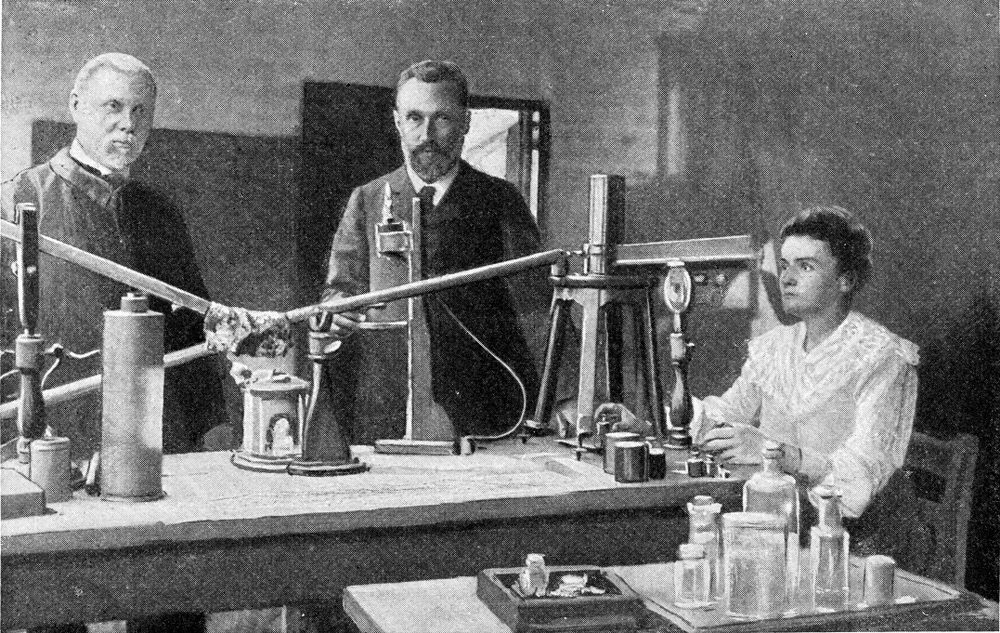We bet you didn’t know about some of the most influential scientists on our list!
What brought about the revolution and evolution we find ourselves in today? The truth is that every now and then, someone genius enough is born who enlightens our world and invents what’s never been imagined before.
We’re talking about scientists responsible for how we see and live today. Humankind has progressed immensely over time. And the outstanding contributions of a few people in the field of science have played a vital role in this growth and transition.
These great scientists have made some amazing inventions and discoveries that have changed how we live. They deserve a tribute from us. So, let’s get to know the most influential scientists who changed the world as we know it through their contributions and discoveries.
Here are 9 of the most influential scientists throughout history who have significantly contributed to our everyday lives.

Marie Curie (Poland/France, 1867-1934)
Marie Curie’s story didn’t begin in France despite her French name. Her road to success was hard, as equally worthy of respect as her scientific accomplishments.
Born Maria Salomea Sklodowska in Warsaw, she faced some daunting burdens because of her gender and family’s destitution, which originated from the political turmoil at the time.
Curie decided to explore uranium and its mystifying rays as a Ph.D. thesis topic and eventually realized whatever was producing these rays was happening at an atomic level. This was an essential first step to discovering that atoms weren’t the most diminutive form of matter.
It was a moment that would lead one of the most influential scientists to call it radioactivity. Curie’s husband and accomplished physicist Pierre abandoned his work and joined his wife’s analysis.
They began examining minerals, and after processing tons of pitchblende, they uncovered a new element and called it polonium, after Marie’s native Poland.
They published a paper in 1898 revealing their findings, and a mere five months later, they announced their discovery of another element, radium.
Curie, her husband, and Becquerel won the Nobel Prize in 1903 for Physics due to their work on radioactivity, making her the first woman to win a Nobel Prize.
Charles Darwin (England, 1809-1882)
Charles Darwin wouldn’t have exactly been anyone’s first guess for a revolutionary man and one of the world’s most influential scientists. As a young boy, his main interests were studying geology and collecting beetles in the countryside.
It was an invitation to join a journey around the world in 1831 that would make this man become a country parson, the father of evolutionary biology.
While on the HMS Beagle, between bouts of seasickness, Darwin spent his 5-year trip documenting and studying geological formations and myriad habitats throughout much of the Southern Hemisphere and the fauna and flora they possessed.
Darwin’s observations made him realize that the Victorian-era theories of animal origins were off. Most people of his time still stuck to creationism, the idea that a divine being was accountable for the assortment of life we find on Earth.
But through all this, the theory of evolution was never far from his mind, and the different areas of research he followed only strengthened his beliefs. This influential scientist slowly gathered overwhelming evidence to favor evolution 20 years following his voyage.
His musings and observations eventually merged with On the Origin of Species, issued in 1859 when Darwin.
The 500-page book sold out instantly, and Darwin would deliver six editions, each time adding to and refining his ideas, making him one of the most influential scientists of all time!
Albert Einstein (Germany/US, 1879-1955)
Albert Einstein was the whole package! He had a distinctive look and a witty personality, not to mention a significant scientific cred. Time magazine even named him Person of the Century. His physics skills made him one of the most influential scientists ever.
He remains the last, and perhaps only, physicist ever to become a household name. In 1905, Albert Einstein published his four most important papers. One described the relationship between energy and matter, neatly summarized as E = mc2.
And in 1916, he expanded on relativity with his theory of gravitation: general relativity. Many people consider his general relativity theory his most significant achievement. It predicted both gravitational waves and black holes.
General relativity is also the bedrock of gravitational lensing, which uses the gravity of galaxies and stars as a giant magnifying glass to zoom in on more distant cosmic objects.
Astronomers may soon take advantage of these concepts to see geographic details of worlds that are light-years away.

Sir Isaac Newton (England, 1642-1727)
Did you know that Isaac Newton was born on Christmas Day? At a mere 23 years old, with much of England closed because of the plague, Newton discovered the laws we know today. And by the way… He had to invent a new kind of math as well: calculus.
The English scholar, who was also an introvert, held off on publishing his findings for many years, though. And it took the many efforts of his friend Edmund Halley to get him to publish his work.
Thanks to him, the world’s most influential scientists considered they had a chance of unlocking the secrets of the universe.
As a mathematician who transcended his time and was one of the world’s most outstanding scientists, this influential scientist never went halfway on anything.
And while he had many other scientific achievements, the greatest hits might include his development and refinement of reflecting telescopes, his groundbreaking work on light and color, and other fundamental work in heat and math.
He also dabbled in alchemy and biblical prophecies and spent years trying but ultimately failing to produce the fabled philosopher’s stone.
Galileo Galilei (Italy, 1564-1642)
In the winter of 1609, Italian mathematician Galileo Galilei pointed his telescope towards the moon and practically created modern astronomy.
His following observations turned up four satellites orbiting Jupiter, showing that the Milky Way’s dim light shines from many faint stars.
Galileo also found sunspots on the shell of our star and discovered the stages of Venus, which confirmed that the planet orbits the sun inside Earth’s orbit.
While Galileo didn’t invent the telescope and wasn’t the first to point one at the sky, he is undeniably one of the most influential scientists ever. And we can safely say that his conclusions changed history as we know it.
And while Galilei knew he’d found proof for the theories of Polish astronomer Nicolaus Copernicus, his work wasn’t all staring at the sky.
His research of falling bodies showed that objects dropped simultaneously will hit the ground simultaneously. And his law of inertia even allowed for Earth itself to rotate.

Honorable Mentions:
Katharine McCormick (1875–1967): McCormick is one of the most influential scientists in for women worldwide. Let’s find out why. She planned to attend medical school in 1904 after earning her biology degree from MIT. But instead, she ended up marrying rich.
After her husband died in 1947, she used her inheritance to fund research on the hormonal birth control pill. She also fought to make her college easily accessible to women, leading to an all-female dorm, which allowed more females to enroll.
Stephen Hawking (1942–2018): There are many things we could say about this influential scientist. But we would be here all day! Why do we consider him one of the most influential scientists ever?
The titles of his books indicate the boldness and breadth of his ideas: The Universe in a Nutshell and The Theory of Everything. “My goal is simple,” he had said. “It is a complete understanding of the universe, why it is as it is, and why it exists at all.”
Richard Feynman (1918–1988): To sum up, we can say that Feynman played a big role in 20th-century physics. In 1941, he joined the Manhattan Project.
And after the war, his Feynman diagrams, for which he won the 1965 Nobel Prize in Physics, became the definitive way of showing how subatomic particles work.
As part of the 1986 investigation into the space shuttle Challenger disaster, he explained the issues to the public in easily understandable terms, which was his trademark move.
Marie Tharp (1920–2006): As a geologist and cartographer, Tharp loved maps. Before women were allowed aboard research vessels in the mid-20th century, she explored the oceans from her seat at Columbia University.
With the seafloor, then thought to be almost flat, her canvas and raw data paint, she exposed a landscape of mountain ranges and deep trenches. Her sharp eye also spotted the first indications of plate tectonics working beneath the waves.
Originally dismissed, Tharp’s observations would become essential to confirming continental drift, making her one of the most influential scientists in the world!
Did we miss anyone on our list of the most influential scientists of all time? Let us know in the comments. And if you liked this post, we think you should also read: Unsolved Space Mysteries: 7 Enigmas That Have Baffled Science















2 Responses
I am wondering why Tesla wasn’t included in this list his research and discoveries provided us with so much in the way of discoveries that improved man and our advancements in science. and what about Isaia Mc Coy who provided the way for the industry to work without failing of mechanical parts? While all contributed to the advancement of our knowledge and abilities, we have many that contributed under more mundane means but were no less responsible for advancements that came from their workings. What is more important is that many come from poor and uneducated backgrounds. College degrees are absent. Why, then, do we value these pieces of paper so highly? A mistake realized by one man who sees that not all abilities come from books. Now it seems that we are mistaken in that abilities come from skin color or nationality. The call for “diversity” as a solution to many problems when in reality it is the ability and drive that is the real reason for advancement. While we should set these people apart for recognition, it should be done because of accomplishments done under adverse conditions that never stopped their forward advance. Even abilities must take second place of determination and drive to solve problems. I have seen people with several degrees who couldn’t put what knowledge they had in their heads and use it with their hands. The mistake we make is we assume that knowledge somehow gives us leadership abilities. This said I state that too many are installed as leaders that provide nothing to advance their positions and offer nothing but the arrogance that knowledge makes them right. I am the product that came from parents who taught me that solutions come from the efforts put in. as a result I as a dirt poor boy from Southwest Detroit was able to own and run two companies earning millions. It isn’t from knowledge alone that advances are made.———- I, Grampa
There many great names are missed: Tesla, Leonardo D’Vinchi, Mendeleev, Galvani (electricity); Popov(radio inventor), television inventor Madison and others, first plane builder Zhukovsky, first helicopter by Igor Sikorsky, Steve Jobs ! and many others.